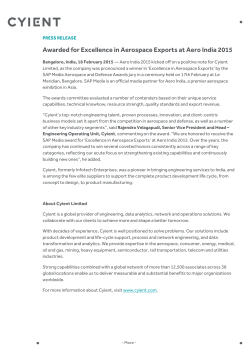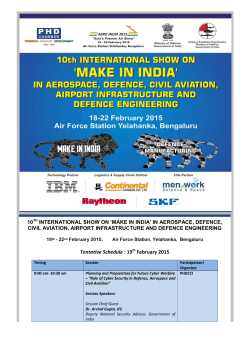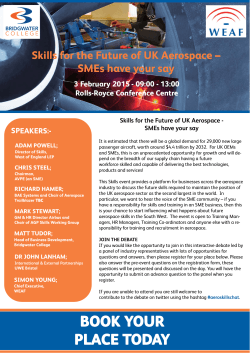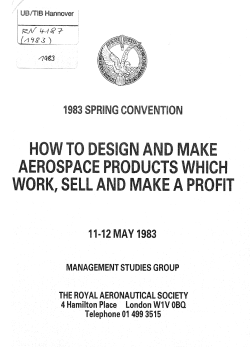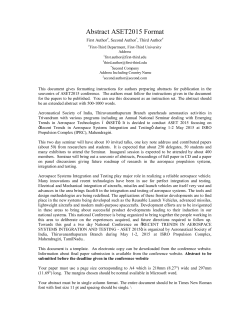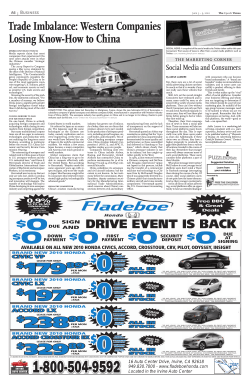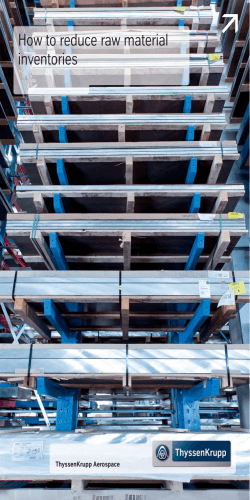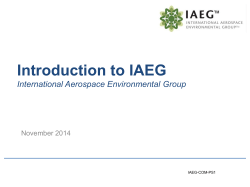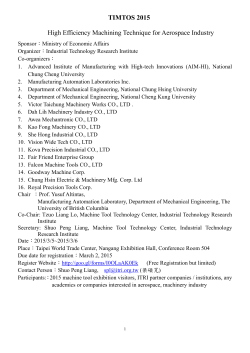
(JN????) A4 Aerospace Charter Brochure
Ian Waddell National officer Aerospace & Shipbuilding sector Janet Golds Research officer, Aerospace & Shipbuilding sector [email protected] Images courtesy of, Rolls Royce, Airbus, Bombardier and Augusta Westland. Unite Charter for Workers in the Aerospace Industry @unitemanufactur For further information and to join Unite please go to www.unitetheunion.org (JN????) HB271014 www.unitetheunion.org Unite Charter for Workers in the Aerospace Industry The Aerospace industry in the UK is one that Unite believes is of strategic importance to the UK economy, employing over 109,000 people directly – 3,300 of which are apprentices and trainees, added to which there are an estimated 300,000 jobs in the supply chain and allied industries. The industry is the second largest in the world and is built on high value jobs, employing highly skilled and technologically proficient workers whose knowledge, expertise and experience produce outstanding products that are the envy of the world. The UK has world-leading capabilities in both civil and defence aerospace. Unite members are crucial to the success of the industry and are involved in every stage of production from research and development, right through design, manufacture, assembly, testing and delivery and beyond. The products embody levels of technology and complexity that are inspirational and are at the forefront of technological research and the industrial dynamism of the wider manufacturing sector. The UK’s Civil & Defence Aerospace industries are major contributors to the UK economy, through innovative manufacturing techniques and research into new technologies. The industry represents the cutting edge of human achievement and genuine innovation at the vanguard of science and engineering. This transfers effectively into other industrial sectors and promotes economic growth throughout the whole economy. It is for these reasons that Unite campaigns tirelessly for the greater recognition of the skills, knowledge and experience of the members employed within the sector and the vital contribution they make to the UK economy. In response to the challenges that have been growing for workers in the industry Unite members have drawn up this Charter which highlights the campaign objectives for the industry and those who work here in the UK. Charter aims: 1. To campaign for UK employment rights that will be models of best practice in Europe. 2. To lobby for comprehensive and sustained investment in Aerospace which guarantees’ UK jobs. 3. To press employers for union involvement before strategic decisions are taken which affect our members. 4. To actively campaign for the best terms and conditions across the industry. 5. To highlight the prime strategic importance of Aerospace to the UK economy and campaign for direct government involvement to protect the industry in the UK. 6. To campaign for the provision of a first class skills, training and apprentice programmes to develop all Unite members and equip them with the skills for the industry of the future. 7. To maximise political influence at every level to promote the case for the Aerospace industry in the UK. 2 1 UK Defence Statistics 2011. 2 ADS – UK Defence Survey 2011. 3 Rest of the World – Middle East, Brazil, South-East Asia and India. 3 1. To campaign for UK employment rights that are models of best practice in Europe Unite believes working people in the UK should have the same protection, security and opportunities for work and prosperity as working people enjoy in other EU industrialised countries. We are concerned about the ease with which multinational companies can take decisions to close manufacturing facilities in the UK and transfer work to other workplaces in the EU and beyond. In the increasingly global economy, multinationals will always choose to make job cuts where it is easier, cheaper and quicker to sack workers. The ‘flexible’ labour market serves only to enable quality jobs to be disposed of, resulting in the de-skilling of the UK workforce and the down grading of the highly skilled workforce needed to increase productivity and improve the UK position in the global industrial economy. As trade unionists, part of our role is to provide protection for hard working people and win fairness and security at work. Balanced against this, the UK still has some of the worst anti-trade union legislation in Europe. Unite has campaigned continuously for the repeal of these laws. The UK has ratified International Labour Organisation Conventions, but does not live up to these standards at home. We support the campaign for a Trade Union Freedom Bill in an attempt to reverse the tide. 2. To lobby for comprehensive and sustained investment in Aerospace, which guarantees’ UK jobs Unite has consistently worked with employers and government to promote and retain a sector that is of vital importance to the UK economy and the wider manufacturing sector. The globalisation of Aerospace with new entrants into the market such as China and the Far East have produced challenges which the members have worked tirelessly to address. The key to the growth in the Aerospace industries in other countries is the support of their government. When an industry such as Aerospace is developing products 3. To press employers for union involvement before strategic decisions are taken which affect our members The members in the Aerospace industry have a long-term vested interest in the success of the companies they work for. A successful and thriving company with trade union recognition and a strong trade union membership is the best way to guarantee job security, decent pay and good terms and conditions of employment. However, often our members find themselves subject to unilateral decisions based on the short-term aspirations of shareholders for a quick return on their investment and very little information or consultation over these decisions. We firmly believe in the involvement of workers in the strategic decision making process. As such, to give the members a voice and the legal right to be informed and consulted we would want to see formally negotiated information and consultation policies in all workplaces. We have a commitment to assist any Unite members and workplace representatives from the Aerospace industry to populate European and Global Works Councils so that the member’s collective voice is heard and its influence felt at all levels within the industry. 4. To campaign for the best terms and conditions, to facilitate the recruitment and retention of a highly skilled workforce The Aerospace industry must provide rewarding career opportunities to ensure the brightest and best are recruited and retained. As a trade union we recognise that excellent terms and conditions are an important part of this package and as such we continue to campaign to protect existing terms and conditions and to ensure that issues that arise due to government policies or changes in the law are addressed. for the market it is vital that the UK government supports the industry and helps in the R&D costs, the development of new products and honours the contractual obligations vital to the Defence industry. Investment into the sector has provided for world class facilities such as the Airbus A350 wing factory at Broughton and Rolls Royce’s engine blade casting facility at Rotherham. Research has shown that the UK Aerospace sector is growing ten times faster than the UK economy. This growth has been facilitated by the Aerospace Growth Partnership, an initiative that Unite members support. It is clear that the opportunities these facilities provide for growth are predicated on the availability of a highly skilled and technologically advanced workforce. It is vitally important that current growth transposes to the supply chain and encourages companies to re-shore back to the UK, in this way more jobs will be created for the industry. 4 An example of this is the growth of agency and contract labour within the wider manufacturing sector. The use of the Swedish Derogation has allowed employers to exploit agency and contract workers and the increase in zero hours contracts is one that we will be campaigning vigorously to outlaw. The use of agency labour provides employers with the opportunity to exploit workers, pay them less, introduce reduced terms and conditions and reap the increased profits this action provides – this cannot continue and needs to be addressed in every industrial sector. We will campaign against the creeping casualisation of work and increase in insecure employment. Unite members in Aerospace were at the forefront of the shorter working week campaign, achieving a 37 hour week settlement in 1990. We will continue to defend this gain and seek to advance to a 35 hour week. The campaign demonstrated the power our members have when they work together for a common aim. Workers deserve decent jobs, secure employment, a safe and healthy working environment, good career prospects and to be encouraged to feel that they are valued as an employee and their work matters. They also deserve to have their existing pension rights protected under law. We demand that workers are treated with dignity and respect in order to create a positive working environment. 5 5. To highlight the prime strategic importance of Aerospace to the UK economy and campaign for direct government involvement to protect the industry 7. To maximise political influence at every level to promote the case for the Aerospace industry in the UK Aerospace is a sector strongly associated with national prestige and international status. Apart from its support of politicians, key opinion formers and decision makers to ensure the transference of aims into contribution to sustainable economic growth, the industry is home to key skills and technologies and is muscular action. As part of this action we intend ensuring that: Having highlighted the key aims in this document, the fundamental element in all of this is to gain the an important driver of innovation. This is in addition to its significance for national security and defence and its creation of high value added jobs. All members in the Aerospace industry in both civil and defence businesses will make contact with their local councillors, MPs, MEPs, MSPs & Assembly Members and arrange site visits in order to increase The wellbeing of the industry depends on the twin pillars, namely civil and defence. They are both awareness of the industry and the work the members do. complimentary and mutually dependent. The UK government must pursue a cross party consensus for Aerospace investment in both civil and defence arenas which recognises, defends and actively supports Our relationship with elected members must be based on a widespread acknowledgement of the the contribution the sector makes to our economy and knowledge base. Unite members believe the strategic importance of the industry which will be reflected in the political decision making process, government should take more active steps to assist the Aerospace and defence industries in their rather than action only being taken in times of crisis. efforts to win export orders and win global market share. We will seek to maximise our involvement with key agencies who inform the government decision making process and ensure the member’s voices are heard. As key stake-holders, workplace representatives should be directly involved in shaping decisions and encouraging investment into the industry. 6. To campaign for the provision of a first class skills, training and apprentice programme to develop all Unite members and equip them with the skills for the industry of the future Encourage members to be politically active and become more involved in the political element of growing the sector. Members recognise that a commitment to achieving the targets laid down by the Lisbon Treaty, one of which is the production of a highly skilled and knowledge intensive workforce is vital for the future growth of the industry. Unite believes it is critically important that government recognises that to preserve the ability to design, build and support complex products, there will need to be a concerted and sustained commitment to retain and promote a number of key skills within the sector. To be able to fulfil this commitment the skills within the sector must be retained and young people attracted to the sector to provide replacement skills for the problem of a sector with an ageing workforce. Evidence has shown that it can take between six and eight years for skilled workers to reach their optimum level of productivity, as such an energetic focus on education, skills and training by all stakeholders in the industry is vital. We can no longer afford to embark on large-scale redundancy programmes which strip the industry of its most experienced and talented workers. We must use troughs in demand to take people off-line and train them so we are ready for the upturns. Unite supports the development of the Talent Retention Solution to assist in retaining skilled workers in advanced manufacturing industries such as Aerospace. 8 6 The Destinations of the Defence Pound, Trevor Taylor and John Louth at www.rusi.org 12 Science, technology, engineering and maths. 7
© Copyright 2026
